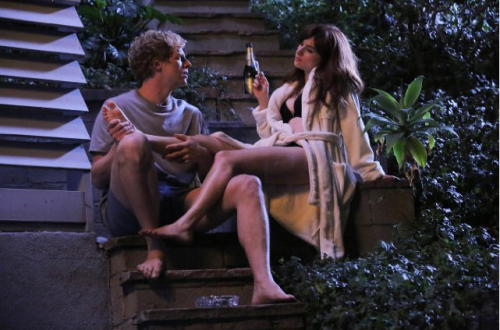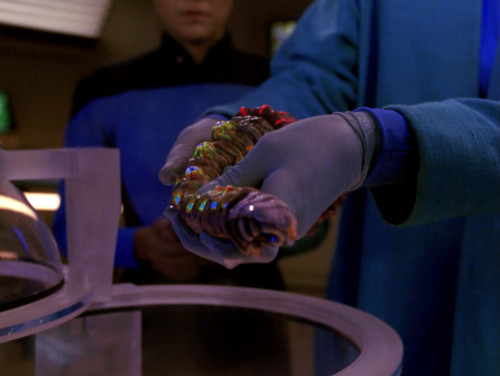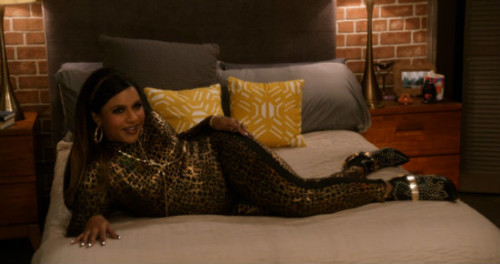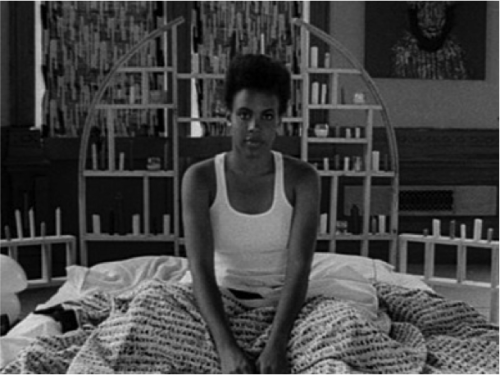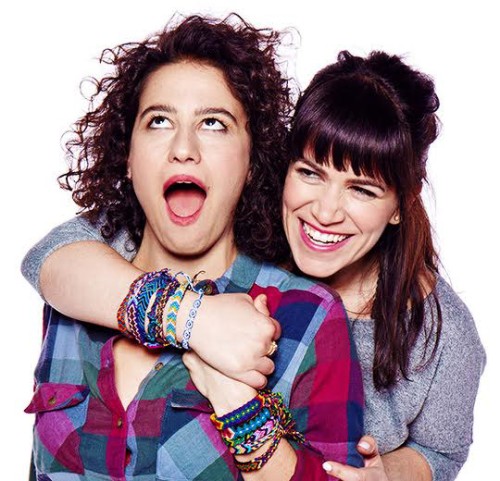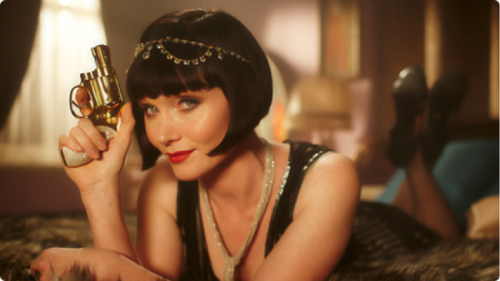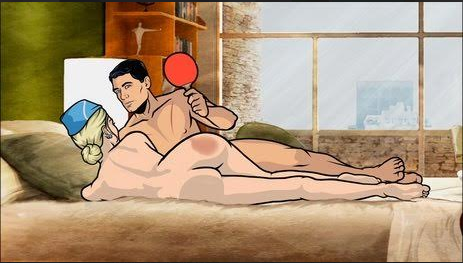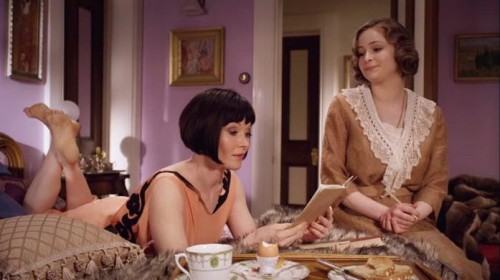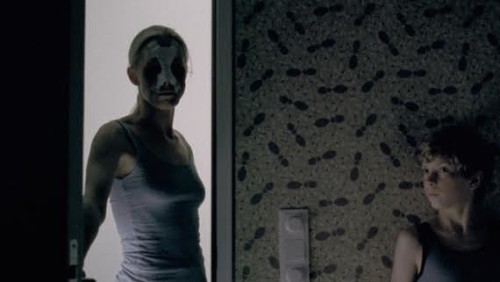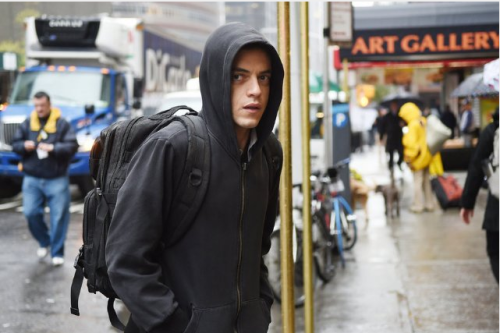This guest post by Giselle Defares appears as part of our theme week on Sex Positivity.
Sex is one of the strange wonders in our life. Many of us barely flinch when it comes to the sexual intrusiveness in our contemporary media. Oh, how the times have changed. Twenty years ago it would be Roseanne and Dan winking at each other. In recent years the boundaries have slowly been pushed back in our TV-landscape when it comes to the act of swapping bodily fluids– see Californication, True Blood, or The Americans. Sexual freedom is not only shown on cable shows such as HBO or FX, but also on network TV (see Scandal’s “Olitz” scenes on ABC). Everything is shown: same-sex scenes, masturbation, sex scenes from a woman’s perspective, you name it. In our modern society, it can sometimes be hard to navigate the complexity of sex, or get an accurate media portrayal of the gray messiness that sex, love, and relationships entail. Fear not, there’s the dark comedy gem of FX, You’re the Worst, which had its 10-episode debut season in 2014.
The romantic single-cam comedy is created by first-time showrunner Stephen Falk. He started out writing and producing for dark comedies such as Weeds and Orange is the New Black. Falk and his creative team specifically focused on detailed world-building in the show. He chose to divide the post-pilot episodes into three acts , each with their own director. In this way each episode can work individually (within its group) or as one part of the major arc.
It’s a surprising choice for Falk to mold his vision in the form of a modern sitcom – perhaps the redundant comparison comes as a result of the 30-minute format. After all, the format of the American sitcom, well, seems a bit dated, yet somehow it works for the show. The romantic influences in the show vary from the 1950s John Osborne play Look Back in Anger, ultimate rom-com When Harry met Sally, to the sitcom Mad About You. Falk created flawed characters, who in essence are just lovable dickheads. He commented on the beating heart of the show: “No matter how damaged we are, we all are deserving of love.”
You’re the Worst centers around Jimmy Shive- Overly (Chris Geere), a narcissistic, mediocre, English writer living in Los Angeles whose day job consists of insulting anyone he doesn’t think is as smart as him. After going to his ex’s wedding he ends up having a one night stand with the laissez-faire publicist, Gretchen Cutler (Aya Cash). Despite their differences the two decide that they don’t want to stop seeing each other. The supporting cast consists of Gretchen’s best friend Lindsay Jillian (Kether Donohue), whose marriage to nerdy husband Paul is crumbling (Allan McLeod). Jimmy’s roommate Edgar (Desmin Borges), a sweet military veteran who suffers from PTSD and dabbles in selling drugs. Gretchen’s boisterous client, the rapper Sam Dresden (Brandon Mychal Smith) and his faux Tyler The Creator gang that consists of Shitstain (Darrell Britt Gibson) and Honey Nutz (Allen Maldonado).
You’re the Worst’s honest take on modern sexuality starts right in the pilot. During a well-deserved break in their one-night stand, while they munch on pasta, Jimmy quips to Gretchen, “I’m glad that this is a one night thing so we can reveal all this awful shit about ourselves.” They high five and Jimmy drops pasta from his fork on his crotch and Gretchen quickly says, “I’ll get that.” Aha, a woman who’s not afraid to get what she wants. We see various clips in their hilarious graphic sex montage. Gretchen straddles Jimmy whilst she’s chewing gum and she pensively states, “ I don’t even know what I’m doing here. I’m not attracted to you.” Jimmy just looks at her and says “ What has that got to do with anything?!”
Yet, the most graphic and funny (sex) scene in the pilot is when Jimmy performs an oral act and spits on Gretchen’s vagina:
Gretchen: “Did you spit on it?!”
Jimmy: “It’s saliva. It’s going to get there anyway.”
Gretchen shrugs.
Well, there’s certainly a nice amount of sexual activity in the show. Girl goes down on boy, boy goes down on girl, even attempts at threesomes. It’s sad that it seems revolutionary that the characters on the show have a healthy relationship and enjoyment with sex.
Jimmy and Gretchen are commitment-phobes who are running away from responsibility in every aspect of their lives. They have absolutely no qualms with physical intimacy but they run when they develop some level of emotional intimacy. They’re self-absorbed, often engage in destructive and self-destructive activities, and struggle with the concept of adulthood and the inevitable romantic relationships that will follow. Their obnoxious behavior can be awful but Falk ensured that the moments aren’t gratuitous.
Gretchen is portrayed as a capable but laid-back publicist. She’s snarky, loud, magnetic, and complex. She’s also selfish, self-aware, and caring. Gretchen is definitely not the bumbling goody two-shoes that’s normally shown in the romantic genre. She hates that she cares about her intimate circle and tries to hide her feelings but can’t. Her quips are what make her endearing – especially her conversations with Sam and his crew. In episode 3, “Keys Open Doors,” Gretchen leaves Jimmy and states, “Well as my grandma used to say, ‘It’s only a walk of shame if you’re capable of feeling shame.’ See you later, thanks for doing all the sex stuff on me.”
Jimmy could have been one of the more one-dimensional characters. He’s sarcastic and almost shows no signs of humanity. It’s slowly revealed in defining moments that he does have feelings or even a soul. One of the top moments is when Falk toyed with one of the more cliché rom-com tropes. In episode 8, “Finish Your Milk,” Jimmy and Gretchen have a big fight when he finds out that she presents a Wasp version of herself to her parents. He tracks her down at their country club lunch (as you do) and delivers a big speech how they don’t know the real version of their daughter. In a nice twist, it turns out that “whiteknighting” isn’t what Gretchen needs and she breaks up with him for it. Well, that’s definitely a feminist silver lining in a romantic situation.
The quips and honesty surrounding sex is what sets the tone for the show. It’s not only seen in the budding relationship between Gretchen and Jimmy but also in Gretchen’s relationship with her bestie Lindsay. Falk took the stock characters from romantic comedies and flipped them upside down. Lindsay is the self-absorbed and annoying best friend. She easily could have been one-note but the writing and the comedy chops of Kether Donohue really make it work. Lindsay has heart, a lot of personality and a high sex drive. In the pilot, Gretchen is picked up after her romp with Jimmy and she spills the beans to a disapproving Lindsay. Gretchen quips, “You’re being shitty and judgmental to me. How many guys did you blow at our five-year reunion?” Ah, who doesn’t love the frankness between two good friends?
Jimmy and Edgar’s relationship isn’t as tight, but whether he knows it or not, Jimmy really needs Edgar. In the first episodes it seems that Edgar is only there to lent an ear to Jimmy and cook him the most fabulous cuisine. Edgar fulfils the role of the kooky roommate but throughout the season we’re shown an heartwarming arc. He’s realistically messed up, struggles with daily social situations and is Jimmy and Gretchen’s number one fan. During the episodes we’ll see that he (well, actually both Edgar and Lindsay) becomes a fully developed character who stands on his own and doesn’t necessarily exist to serve Jimmy and Gretchen’s arc.
Why is the relationship between Jimmy and Gretchen believable? The emphasis lies on two people being present in their relationship whilst they navigate a society that has become less conversational and more self-indulgent. In their own unique way, both Gretchen and Jimmy listen, and see each other for who they really are – they don’t judge and accept the other one’s choices. This is a refreshing take on romantic relationships on TV.
You’re The Worst is a romantic comedy/mirror on our society about romantic dating. Love is exhilarating, hard, and quite often people struggle between loneliness, vulnerability, and the satisfying experience when you meet another person who just gets you. It’s not the representation for millennial dating – since there are so many different points of view when it comes to love and sex- but it certainly comes close for many of us. Jimmy, Gretchen and their squad are all messed up people. They can be snarky, manipulative and mean. You really shouldn’t, yet you care about them, even root for them and want them to do well.
You’re the Worst is an underrated show about romantic dysfunction. It’s one of the better comedy shows on TV right now; quite frankly, if you’re not watching it you’re doing yourself a disservice.
[youtube_sc url=”https://www.youtube.com/watch?v=-_sxdO7M69Q”]
Giselle Defares comments on film, fashion (law) and American pop culture. See her blog here.
